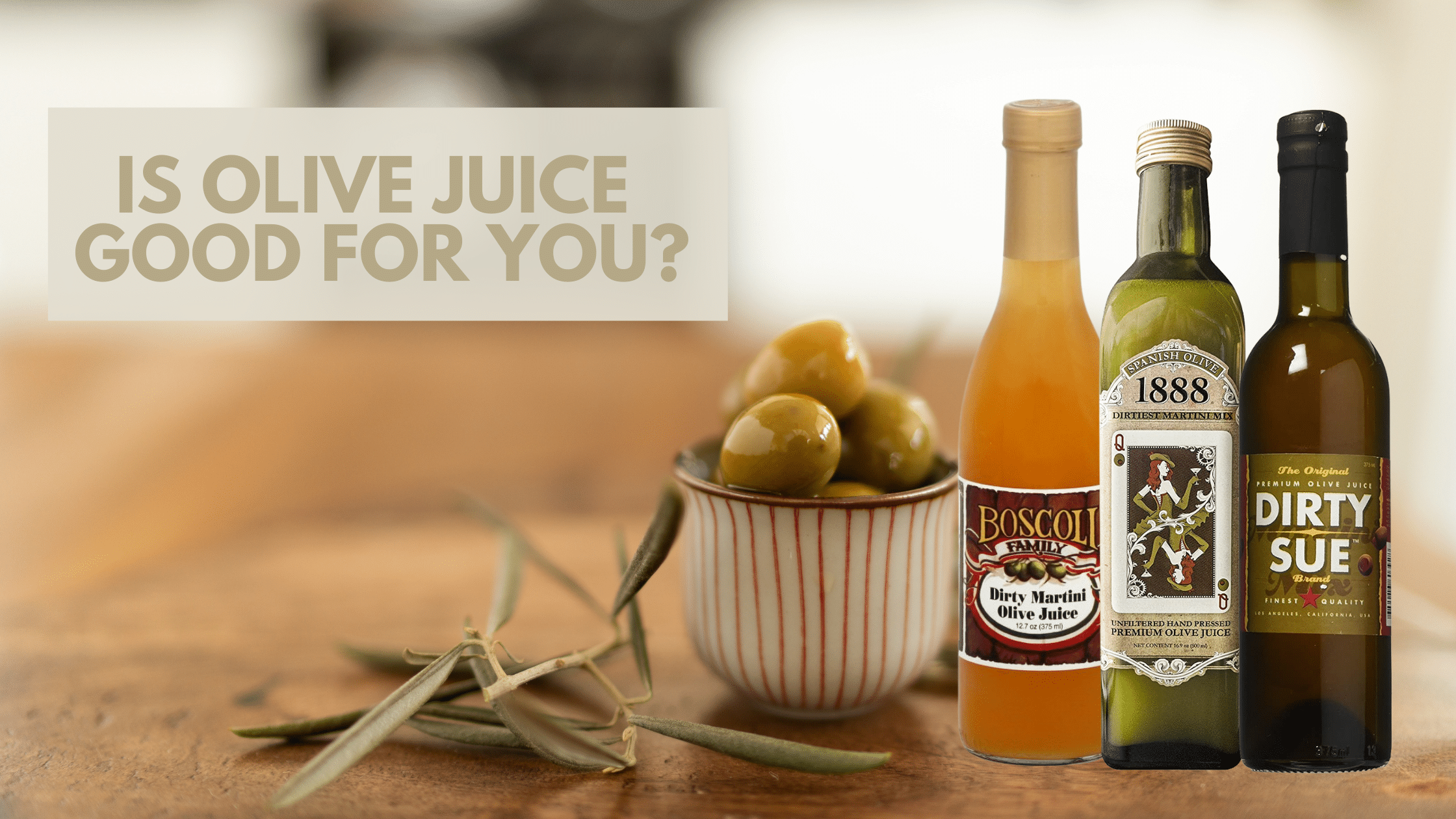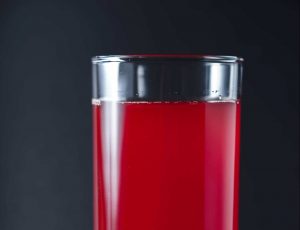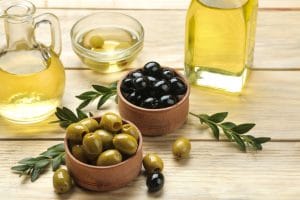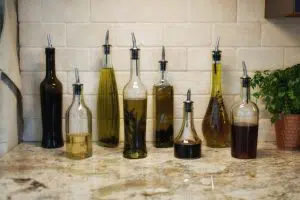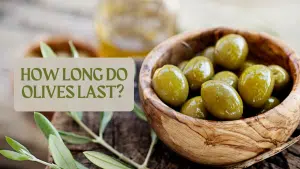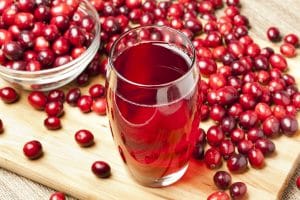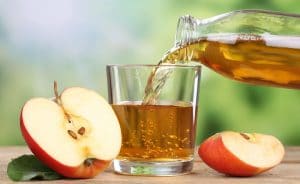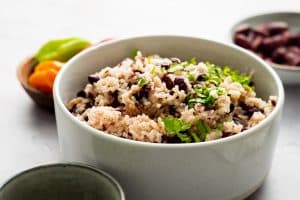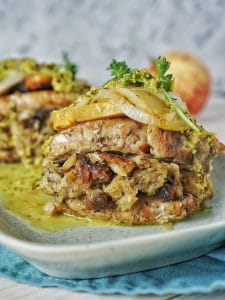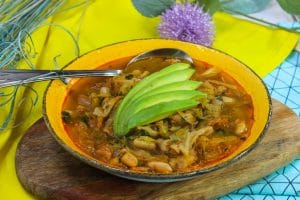Is Olive Juice Good For You?
Important Note: When you buy through our links, we may earn a commission. As an Amazon Associate we earn from qualifying purchases. Content, pricing, offers and availability are subject to change at any time - more info.
Olive juice is the pickling water left in the jar of olives. Until I knew the full benefits of this salty brine, I used to just throw it out. Now I always keep it. Olive pickling juice has a lot of uses in the kitchen and in the mixology of the cocktail bar. It also contains many health benefits if it is made with good ingredients.
Olive juice is a hydrating liquid containing healthy monounsaturated fats, beneficial for overall health. This blend of water, salt, vinegar, and olives is rich in electrolytes and probiotic bacteria. Olive juice can help stabilize high blood pressure and the body’s PH balance.
The benefits of eating olives and cooking with olive oil are well known. The many advantages of adding olive pickling juice to food and drinks are less well known. Can you take a shot of pure olive brine and derive health benefits from it? Let’s explore the possibilities this humble liquid contains.
- Health Benefits Of Olive Juice
- Health Warnings When Drinking Olive Juice
- Is Olive Juice Good For Cats?
- The Difference Between Olive Juice, Brine & Olive Oil
- Can You Make Olive Juice Or Olive Brine Yourself?
- How To Use Olive Juice In The Kitchen
- How To Use Olive Juice In Cocktail Mixing
- Recipes Using Olive Juice Or Brine
- Where To Buy Olive Juice Online
- So, Is Olive Juice Good For You?
Health Benefits Of Olive Juice
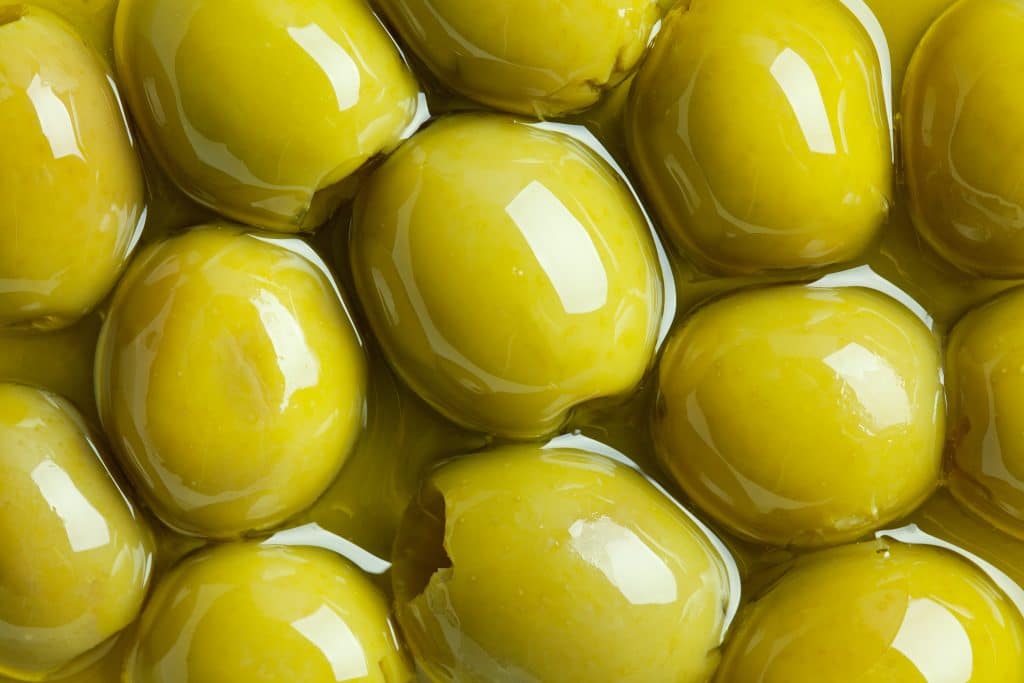
The olive tree (Olea europea) has been famous for its healthy fruit for thousands of years. The olives marinating in the brine impart their goodness and flavor to the juice.
Olives are rich in various substances like healthy fats, vitamins, amino acids, and antioxidants.
Oleuropein is a compound in plants with antioxidant, anti-angiogenic (slowing the growth of cancer cells), and anti-inflammatory actions. Olives and olive juice are rich in Oleuropein that is beneficial in the fight against all aging-related diseases. Follow this link for an in-depth study on the various and unexpected benefits of Oleuropein.
Eating olives is healthier than merely drinking the juice. The juice does contain many wholesome compounds that are worth ingesting. What benefits are there in drinking brine juice that has been infused with the nutritious essence of olives?
Olive Juice Can Help With PH And Water Balance
Olive juice contains trace amounts of essential minerals like potassium, calcium, and sodium. The word essential means your body cannot produce these minerals by itself. Olive juice has an electrolytic function in maintaining the body’s water balance.
Electrolytes also help regulate the acid balance and assist in nerve and muscle repair.
Olive juice makes a good after-sport drink, replenishing the electrolytes lost in sweating. This is a much healthier alternative than sports drinks containing heaps of sugar. Olive juice has a high mineral salt content, which is a good source of sodium. Beware of pickle juice containing industrial vinegar, which is not so healthy.
People suffering from muscle cramps can expect fast relief by drinking two tots (2-3 ounces) of olive juice. This is an excellent natural remedy for a condition that can cause much anguish and disturbed sleep. There is evidence that olive juice can also relieve menstrual and other stomach cramps.
Olive Juice As A Probiotic
Olive brine made with naturally fermented vinegar is a good source of lactobacillus bacteria which promotes gut health. A one-shot glass of olive juice can contain 14 billion units of beneficial, live, probiotic bacteria.
Sugar is a known enemy of digestive and gut health and can acidify your system. Olive juice can help to curb sugar cravings.
When looking for good quality pickle juice, be sure to check that no sugar, industrial vinegar, and colorants are added. Organic olives fermented in a good quality brine have anti-inflammatory and antioxidant properties. A good guideline is to look for pickled products stored in the store’s refrigerator section.
The probiotics in olive juice can help enhance the body’s immune system. Side benefits of a healthy gut include lower allergies, teeth and gum health, and mood-stabilizing functions.
Olive Juice Can Lower Cholesterol And Blood Pressure
Olives contain a high percentage of oleic acid. Monounsaturated fatty acids are essential to our well-being. Olive juice can increase healthy cholesterol levels that support heart health and fights inflammation. Olive juice can help lower the risk of diseases linked to high cholesterol like strokes, diabetes, and high blood pressure.
Olive juice’s high oleic acid content enhances its fat-burning properties. Include olives and fermented brine water in a weight loss program. Olive juice can lower blood sugar levels. It provides a low-fat and high carbohydrate option for dieting.
Olive juice can help control free radicals and oxidative stress that is part of growing older with its rich vitamin E content. Long term oxidative stress in the body can cause the following health conditions:
- Cancer
- Alzheimer’s and Parkinson’s disease
- Diabetes
- Inflammation
- Chronic fatigue
- Asthma
- High blood pressure
- Cardiovascular conditions
Olive Juice And Baby’s Development While Pregnant
Olives are one of the foods pregnant women often develop a craving for. Olives and olive juice helps with regulating the salts and minerals in the mother’s body, which affects the growth of the baby. Oleic acids keep cholesterol levels down and have antioxidant effects to protect your baby from allergies and asthma.
Olives and olive juice can assist the immune system of mother and baby. The Vitamins and minerals in olive juice are helpful in the baby’s physical, neural, and mental development. Do not overdo the intake of olive juice. Pregnant mothers should check their sodium intake even when they have constant salt cravings.
Health Warnings When Drinking Olive Juice
Olive pickle juice has many health benefits, but please be cautious if you have high or low blood pressure. Some people may experience adverse effects due to olive brine’s high salt (sodium) levels. Olive juice can interact with diabetes or high or low blood pressure medicines.
Olive brine is most beneficial when drunk in small quantities. Consuming and using this liquid in cooking is mainly safe and healthy. All olive juices are not of the same quality. Always check the ingredients and start by trying just a tiny amount at a time. Side effects are a rare occurrence but can include the following:
- Consuming large amounts of olive juice can cause diarrhea and stomach pain.
- Allergic responses can include breathlessness, nausea, and sinus reactions.
- Olive juice drunk in high quantities can cause weight gain.
- High consumption can cause water retention, bloating, and swelling due to the high sodium content.
- People suffering from low blood pressure should check with their health advisor or doctor before drinking olive juice.
Is Olive Juice Good For Cats?
Cats can seem interested in sampling the olives you are eating, but would it be wise to give them some olive juice? Cat owners are familiar with their cat’s extreme response to the Catnip plant. Some cats might have the same reaction to olive juice. If your cat seems to want olive juice, give it a tiny amount. Be aware of the intense salt content.
All cats have different responses to Catnip, from ecstatic to aggressive. Nepetalactone is the plant compound that produces these responses. Felines have a vomeronasal organ that senses the presence of sex hormones. The Nepetalactone in olive juice can trigger this organ into action. If catnip makes your cat aggressive, don’t give it olive juice.
The Difference Between Olive Juice, Brine & Olive Oil
When it comes to mixing cocktails, olive juice and olive brine are the same. There is a slight difference, though. Fresh olives contain juice, which is pressed out of the fruit to make olive oil. After this extraction process, and olive paste is formed. This is separated into water (the juice), olive oil, and solid olive pip residue.
Some olive juice will fuse into the brine as the olive fruits are pickled. This is why olive brine and olive juice roughly possess the same benefits. You can buy olive juice that is not brined but check the ingredients. Pure olive juice should not contain vinegar. Brining juice often contains vinegar. Let’s clarify the differences.
- Olive Juice: A non-salty liquid obtained when pressing olives.
- Olive Oil: The oily substance obtained when pressing olives.
- Olive Brine: A mix of water, salt, and sometimes vinegar (or Vermouth) in which whole olives are left to marinade and mature for four weeks to four months.
Olive brine made with naturally fermented vinegar or omitting vinegar can be called olive juice.
- Olive Leaf Extract: A health supplement made from the leaves of the olive tree.
Can You Make Olive Juice Or Olive Brine Yourself?
It is easy to make olive brine using olives, salt, water, and vinegar. If you can find fresh olives, put them in a bottle and pickle with freshly made brine. Decant the existing brine in a bottle of store-bought olives and fill it up with the brine in the linked recipe. The decanted juice can then be used in drinks and cooking.
How To Use Olive Juice In The Kitchen
Olive brine is a versatile condiment that can be added to many dishes. Before using olive juice in recipes, taste it first. It is helpful to know how salty it is before adjusting the additional salt in the recipe. Here are some ways to use olive juice in cooking.
- Add olive juice to packaged or homemade pasta and pizza sauces.
- Use in soups and stews to impart extra umami flavors.
- Olive juice can be used instead of stock in various recipes.
- Olive juice is the perfect ingredient to add saltiness and flavor to salad dressings.
- Add olive brine to homemade ketchup and chutney.
- Adding olive juice to hummus can make the blending smoother and enhance the flavor.
- Use instead of milk or water when making scrambled eggs.
- Add olive juice to mashed potato or cauliflower mash.
- Pickle vegetables like carrots, baby marrow, and cooked beetroot in olive juice.
- Use olive brine in meat marinade recipes.
- Marinade unsalted pork chops, lamb chops, or chicken pieces in olive brine for two to three hours. This will add juiciness and flavor.
- Put some extra flavoring in the jar of olive juice by adding coriander seeds, bay leaves, cinnamon bark, or lemon peel.
- Add olive juice to olive bread recipes.
- Sprinkle olive juice over fresh, warm, steamed vegetables such as spinach, kale, or broccoli.
How To Use Olive Juice In Cocktail Mixing
Dirty Martini derives its name from the olive brine added to the clear alcohol, making it somewhat murky in color. Olive brine is a popular ingredient in cocktails. It adds a savory sensation that often enhances the liquor.
It is said that President Roosevelt celebrated the end of the prohibition laws in 1933 by drinking a Dirty Martini.
Experiment with the savory-goodness of olive brine in Vodka, Gin, Martini, and Vermouth cocktails. Here are a few cocktail ideas for your next sundowner party.
- Dirty Martini: Mix 2 oz Vodka, ½ oz dry Vermouth, and ¼ oz olive juice. Serve with three olives on a stick.
- Dirty Clementine Martini: Mix the juice of 6 clementines with 3 to 4 oz Vodka, 3-4 oz Cointreau, and 1 oz olive juice in a jug and chill for up to 8 hours. Chill the glasses in the freezer and pour halfway with the Martini mix. Fill the glass with chilled Champagne and serve with thinly sliced clementines.
- Dirty Sanchez: Add 2 oz Tequila (aged), ¼ oz dry Vermouth, and ½ oz of olive juice to a shaker full of ice. Shake well and pour into a glass decorated with a speared olive.
- Bloody Mary: Take 4 cups of tomato juice and blend with 3 shots of Vodka, 1 tbsp of olive brine, 1 tsp Worcester sauce, a bit of hot sauce, and some pepper and celery salt. Serve with a stick of celery.
Recipes Using Olive Juice Or Brine
Various recipes can be enhanced by replacing some cooking liquid or stock with olive juice. Hold back on adding extra salt before tasting, as the olive juice will add saltiness. Try adding some olive juice to the following recipes.
- Simple brine for chicken wings. Replace some of the water with 4 tbsp olive juice.
- Olive Oil Popovers. Replace 2 tbsp of milk with olive juice.
- Lacto-fermented peach jalapeno hot sauce. Replace two tbsp of the water with olive juice.
- Pickled beetroot. Replace half a cup of vinegar with olive juice.
- Creamy avocado vinaigrette. Replace the milk in this recipe with olive juice.
Where To Buy Olive Juice Online
Order olive juice online when you don’t have the time to make your own olive brine juice. These bespoke olive juice mixers can also be added to soda or tonic water as a non-alcoholic beverage.
1888 Dirtiest Martini Mix
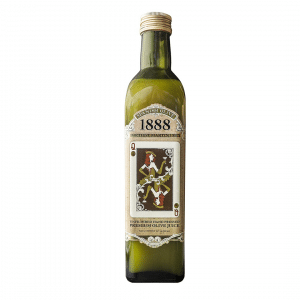
True bottled olive juice with 60% less sodium
Dirty Sue Olive Brine Juice
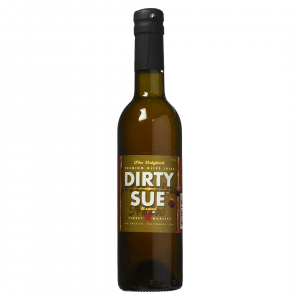
Double filtered olive juice brine
Boscoli Dirty Martini Olive Juice
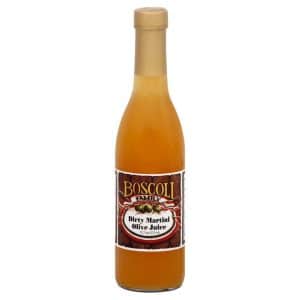
Fine quality containing water, salt, lactic acid.
So, Is Olive Juice Good For You?
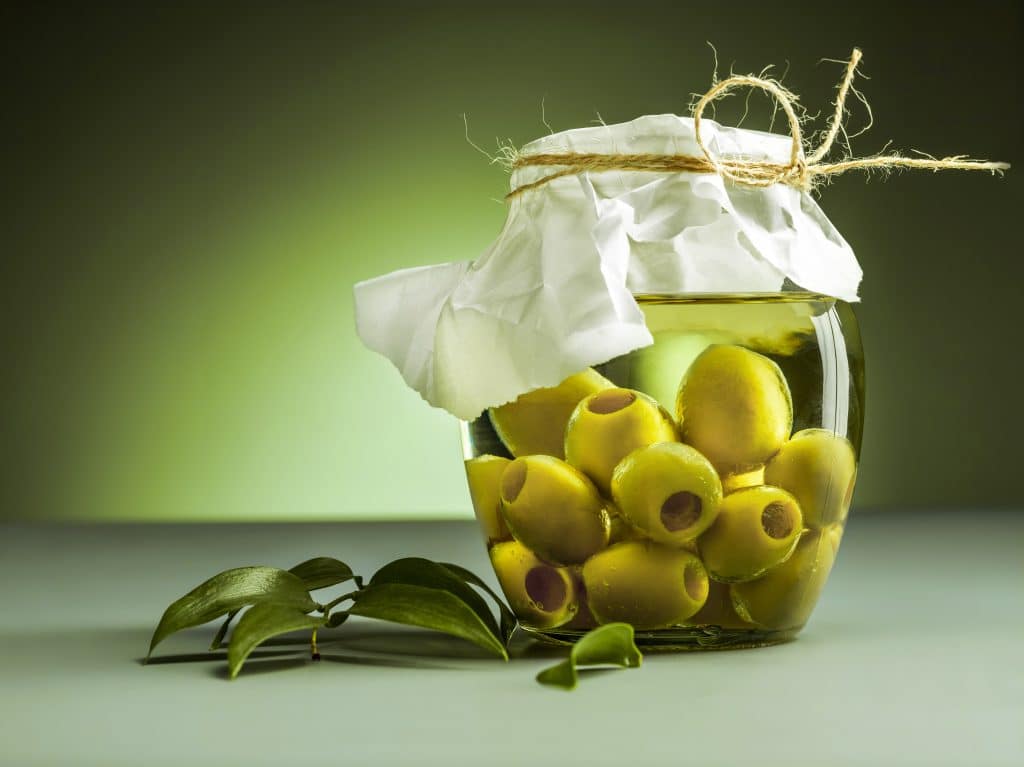
Olive juice or olive brine can give extra Oomph to your favorite food and cocktail recipes. Not only will it add flavor and depth, but it also has health benefits. It is a delightful discovery that something you use to just throw down the drain can be good for you.
